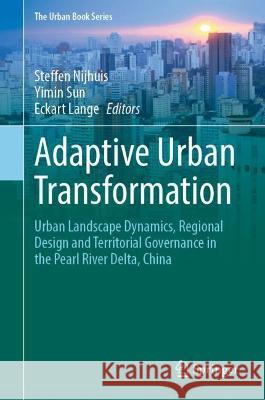Adaptive Urban Transformation: Urban Landscape Dynamics, Regional Design and Territorial Governance in the Pearl River Delta, China » książka
Adaptive Urban Transformation: Urban Landscape Dynamics, Regional Design and Territorial Governance in the Pearl River Delta, China
ISBN-13: 9783030898274 / Angielski / Twarda / 2023 / 290 str.
Adaptive Urban Transformation: Urban Landscape Dynamics, Regional Design and Territorial Governance in the Pearl River Delta, China
ISBN-13: 9783030898274 / Angielski / Twarda / 2023 / 290 str.
(netto: 191,21 VAT: 5%)
Najniższa cena z 30 dni: 192,74
ok. 22 dni roboczych.
Darmowa dostawa!
This open access book provides a cross-sectoral, integrative and multi-scale design and planning approach for adaptive urban transformation of fast urbanising deltas, taking the Pearl River Delta (China) as a case study. Deltaic areas are among the most promising regions in the world. Their strategic location and superior quality of their soils are core factors supporting both human development and the rise of these regions as global economic hubs. At the same time, however, deltas are extremely vulnerable to multiple threats from both climate change and urbanisation. These include an increased flood risk combined with the resulting loss of ecological and social-cultural values. To ensure a more sustainable future for these areas, spatial strategies are needed to strengthen resilience, i.e. help the systems to cope with their vulnerabilities as well as enhance their capacity to overcome natural and artificial threats.The book provides a unique approach that integrates research in urban landscape systems, territorial governance and visualisation techniques that will help to achieve more integrated and resilient deltas. Based on an assessment of the dynamics of change regarding the transformational cycles of natural and urban landscape elements, eco-dynamic regional design strategies are explored to reveal greater opportunities for the exploitation of natural and social-cultural factors within the processes of urban development.
This open access book provides a cross-sectoral, integrative and multi-scale design and planning approach for adaptive urban transformation of fast urbanising deltas, taking the Pearl River Delta (China) as a case study. Deltaic areas are among the most promising regions in the world. Their strategic location and superior quality of their soils are core factors supporting both human development and the rise of these regions as global economic hubs. At the same time, however, deltas are extremely vulnerable to multiple threats from both climate change and urbanisation. These include an increased flood risk combined with the resulting loss of ecological and social-cultural values. To ensure a more sustainable future for these areas, spatial strategies are needed to strengthen resilience, i.e. help the systems to cope with their vulnerabilities as well as enhance their capacity to overcome natural and artificial threats.The book provides a unique approach that integrates research in urban landscape systems, territorial governance and visualisation techniques that will help to achieve more integrated and resilient deltas. Based on an assessment of the dynamics of change regarding the transformational cycles of natural and urban landscape elements, eco-dynamic regional design strategies are explored to reveal greater opportunities for the exploitation of natural and social-cultural factors within the processes of urban development.











